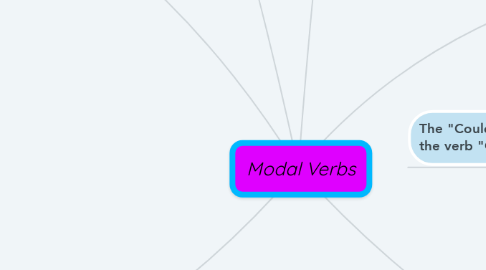Modal Verbs
by Gilberto Rojas

1. Will
2. Would
3. May
4. Definition
5. Applications
6. Characteristics
7. The modal verb may is used in affirmative or negative sentences, always followed by an infinitive verb to express probability in the future, and at the beginning of the questions to ask for permission with a certain education. In Spanish its meaning would be: could, may, or perhaps.
8. The structures of "May" are as follows: Affirmative: Subject + "may" + verb. Negative: Subject + "may" + "not" + verb (no, "Mayn't" does not exist). Interrogative: "May" + subject + verb +?
9. They are used to indicate probability (maybe ...). To see, in theory, may expresses a greater probability than might. But in practice, people use them interchangeably, with the same meaning.
10. Definition.
11. Would is an auxiliary verb used in English to speak about hypothetical situations in the affirmative, negative and interrogative, regularly in the second conditional in English.
12. Characteristics
13. Structure: Subject / pronoun + would / wouldn't + verb in infinitive.
14. Applications.
15. To build conditionals, specifically the second and the third conditional. For courteous requests and offers in interrogatory sentences. To express our wishes
16. Examples.
17. I would go to the party. You would feel better. That would be great. We will help you.
18. Definition.
19. The modal verb "will" is used to: - Make predictions about the future (I think my team will win).
20. Characteristics.
21. Affirmative sentence: Subject + auxiliary verb (to be) + “going to” + main verb. Negative sentence: Subject + auxiliary verb (to be) + "not" + "going to" + main verb. Interrogative sentence: Auxiliary verb (to be) + subject + "going to" + main verb?
22. Applications.
23. We use the verb will to give the main verb the form of the future, in this case it is an auxiliary. But we can also use it to make predictions, to talk about unplanned actions, or to ask for or offer help.
24. Examples
25. I will be a good student. We will be old friends. It will be a nice day.
26. Maria Rojas
27. #List:33
28. 3rd year
29. The application did not allow me to put images. No matter how hard I tried, I couldn't.
30. Can
31. Could
32. Might
33. Definition
34. Characteristics
35. Affirmative sentences: • Structure: Subject + can + verb always in infinitive.
36. The "Can" is a verb in its present form; used in the English language to express a skill that a certain person possesses
37. Can is a modal verb that we use to talk about something and someone has the ability to do something, but we also use it to ask for or give permission.
38. Applications
39. -She can sing. -He can run very fast. -Can I ask you a favor? -You can eat grapes if you want.
40. Examples
41. Exercises
42. 1) I go with you. Yo puedo ir contigo 7) I to lift this weight. Yo podré levantar este peso 8) I to come sooner. No he podido llegar antes 9) She to come this summer. Ella podrá venir este verano 10) He finish the race. Él no pudo terminar la carrera
43. Definition
44. Characteristics
45. Examples
46. Applications
47. It is a modal verb that is used to express permission, possibility or to make suggestions in the present tense. It is also used to talk about a skill from the past, that is, the past version of the modal 'can'.
48. The "Could" is the past form of the verb "Can",
49. -It could be nice. -You could travel. - Could you help me? -¿Podrías ayudarme? -Could I have a talk with you?
50. -Affirmative Pronoun / Subject + Could + Base Form of Main Verb + Complement. Luis could play the guitar when he was young. -Negative Pronoun / Subject + Couldn´t + Base Form of Main Verb + Complement. Luis couldn´t play the guitar when he was young. -Interrogative Could + Pronoun / Subject + Main Verb Base Form + Complement. Could Luis play the guitar when he was Young?
51. Definition
52. Characteristics
53. Applications
54. Examples
55. The auxiliary verb could be used to indicate possibility. Specifically for something that could happen in the present or future. A good Spanish translation could "puede que" or "quizás".
56. Affirmative sentences: For the formation of an affirmative sentence with the modal verb might, no auxiliaries are needed, nor any conjugation: Subject + MIGHT + verb in base form + complement. To negate you just need to add the word not after the word might. The grammatical structure would be like this: Subject + MIGHT + NOT + verb in base form + complement.
57. Your son could be in the bedroom. She might not take the bus.
58. Could. The verb 'might' expresses weak probability or possibility. It is used when we mean: could, perhaps, could
59. Examples
60. She can take the children with her to Houston. You can lend us the money we need.


